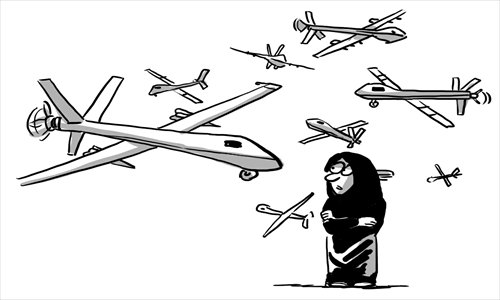Drone strikes ineffective and only serve to help anti-Americanism

On June 8, a US drone attack in North Wazirstan killed seven people. It was the first drone attack since Nawaz Sharif took office as Pakistan's prime minister for the third time. He condemned the attack as a violation of the country's sovereignty.
Drones, or Unmanned Aerial Vehicles (UAV), are being used by the US to kill people seen as militants by the US media and government. As well as Pakistan, drones are also being used in Yemen and Syria to kill people. However, the resentment against drone strikes is present all around the world, including the US itself.
In April this year, some people protested outside the White House, demanding an end to drone strikes. There have also been many protests in Europe and Australia. The chances of a drone strike killing a real terrorist are one out of 100, while most usually kill only civilians and destroy their property.
This has increased anti-Americanism among the people of Pakistan. The Sharif government demanded an immediate stop to drone strikes inside Pakistani territory. The new administration in Islamabad is stronger than its predecessor and is supported by the people.
It is also clearer about people's opinions on Pakistan's relations with the US. There is a chance that the new leaders will take a stand against drone strikes. If the US does not stop such attacks in the future, the already fragile relations may deteriorate further.
The damage to property and loss of life are the immediate results of drone strikes, but anti-Americanism and militancy are the longer-term effects. People who suffer from UAV attacks are more likely to join the ranks of militants.
Sharif is courageous enough to stand against the US and history proves it. In 1998, when India tested nuclear weapons, implying a threat from New Delhi to annihilate Pakistan, Sharif reciprocated with nuclear tests despite immense pressure from the US.
If public pressure grows and UAV attacks continue inside Pakistan, Sharif will likely ask the military to shoot down the drones.
Drone strikes started in Pakistan in 2005, and have so far killed more than 2,500 people, most of whom were innocent civilians. If drone attacks were effective and some terrorists were killed, one could, for the sake of argument, say that since it aids Pakistani forces' hunt for terrorists, they should continue.
However, such a method has proven to be highly dangerous and counterproductive. If the US still believes that it is helpful, then it should share the technology with Pakistan, and the country should start making and using the drones too.
It is the leaders in Islamabad who should decide when and where to fire a drone missile, not people in Washington who are used to giving the orders.
Violating the sovereignty of a country is counterproductive. If Washington wants good relations with Islamabad, it should respect the country's territorial sovereignty. Through cooperation, and with mutual confidence and trust, relations can improve.
The US needs to realize Pakistan's significance to Washington in South Asia. Pakistan can help with bringing about peace in Afghanistan, and can also help with the promotion of regional trade and economy.
After a few twists and turns, US Secretary of State John Kerry will visit Pakistan later this month. He should come, welcome the new government and give a message of support and cooperation. This would boost the confidence of the new leadership and improve the Pakistan-US relationship which has been shadowed by incidents like the drone strikes.
The author is a research fellow at the Islamabad Policy Research Institute. aftabhussein@hotmail.com